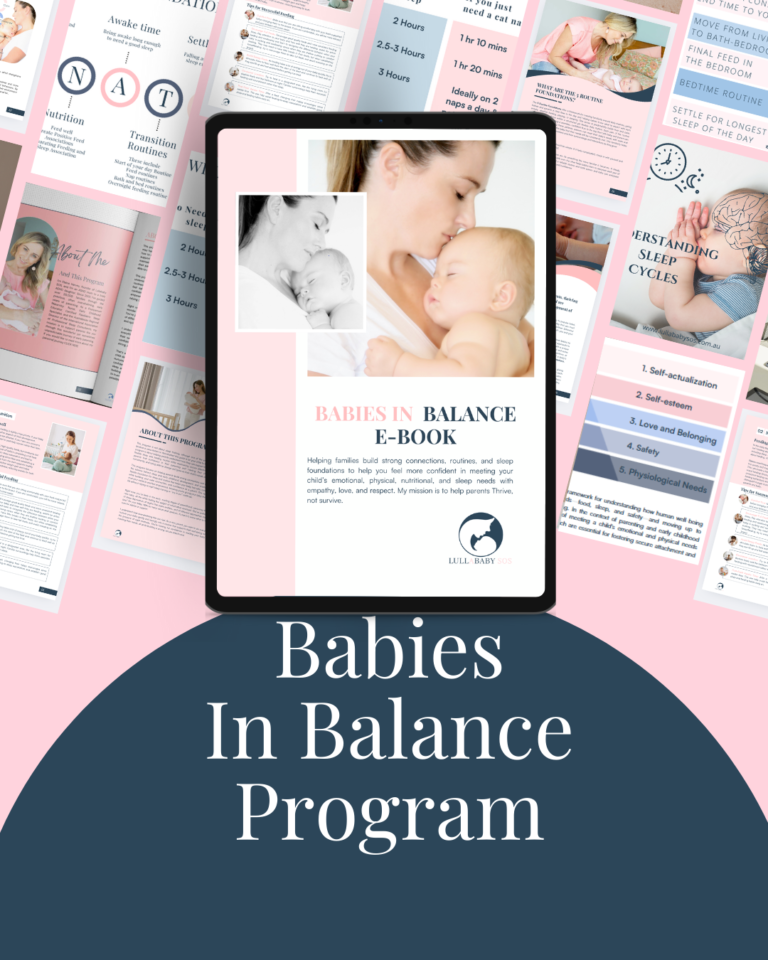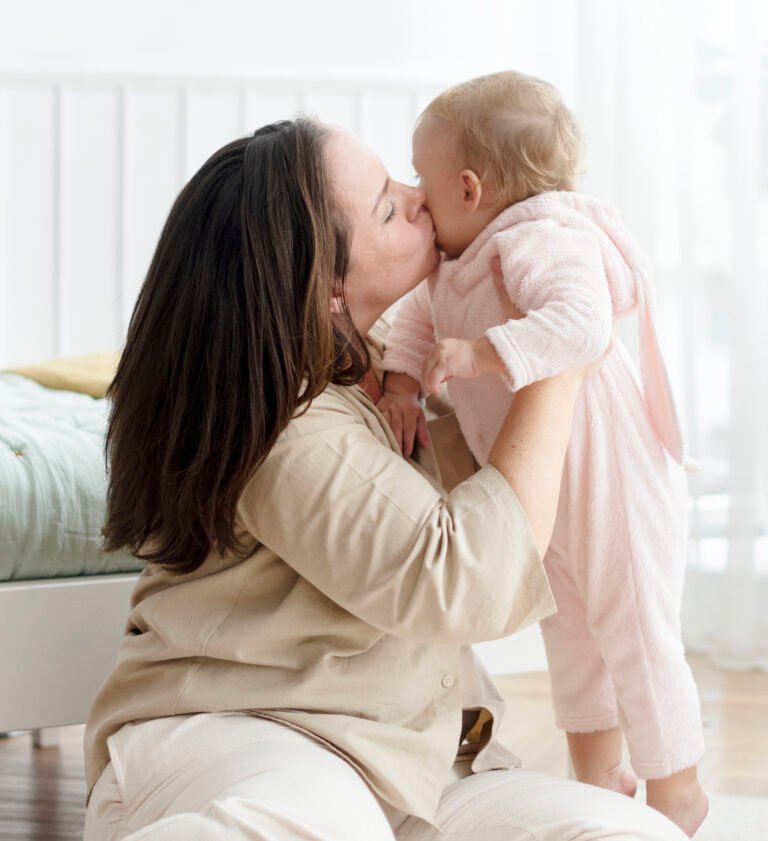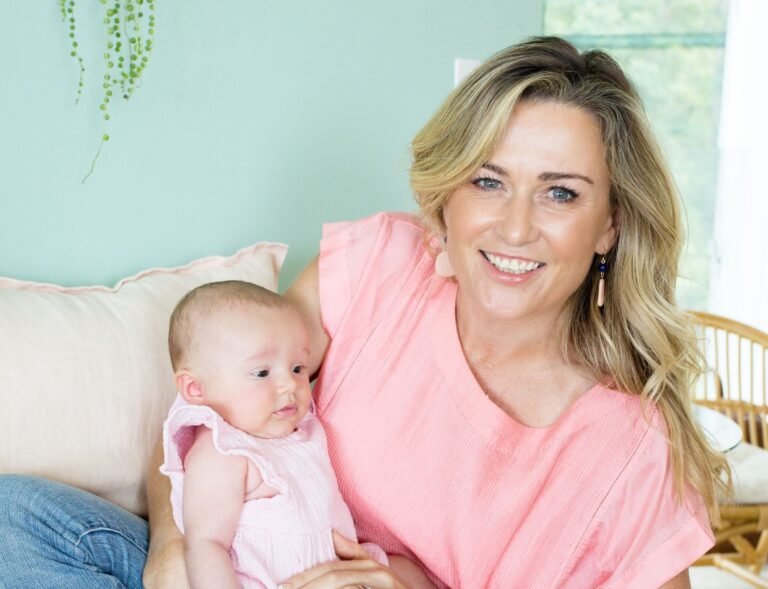
A Gentle, Realistic Approach to Better Sleep & Predictable Routines
Your baby is growing fast—with new skills, more awareness, and big emotional leaps. This stage (4–12 months) can be a beautiful, chaotic blur of nap transitions, early rising, regressions, and bedtime battles.
You don’t need a strict schedule or Cry-It-Out to get through it. You need grounded guidance that balances structure and connection.
Babies in Balance is your step-by-step roadmap for navigating sleep and routines in this pivotal stage—without pressure, guilt, or harsh tactics.
$120.00 Per program

A detailed E-Book, checklists, routine guides, a growing resource library of video tutorials, and more. Explore crucial topics including:

I’m Elaine Harvey—ADHD mum, certified sleep and routine specialist, postpartum nurse, and early childhood educator. For over 22 years, I’ve helped more than 20,000 families navigate the highs and lows of baby sleep with empathy, insight, and real-world strategies.
I created Babies in Balance to give parents a clear, compassionate framework during a stage that can feel especially messy. Because your baby doesn’t need rigid rules—they need rhythms that feel safe and sustainable.

If you don’t see progress after 3 weeks of following the steps, I’ll refund you — no questions asked.

This isn’t your typical sleep training course, and it’s not about rigid schedules or leaving your baby to cry it out. Unlike programs created by someone who found their passion after their own struggles, this program has been crafted over 24 years of hands-on experience with more than 18,000 families worldwide.
I don’t just teach “methods” or provide a one-size-fits-all approach. Instead, I help parents understand how everything in your baby’s day is interconnected—feeding, sleep routines, interactions, and even how you transition between activities. Small, simple changes in these areas can make a big difference in sleep and overall family harmony. My program is grounded in science, focusing on understanding sleep cycles, routine development, and how repetition builds trust and predictability for your baby. It’s all about building calm, confident parenting habits that create a safe and thriving environment for your child.
If you’ve felt like nothing works, it’s likely because you’ve been handed a generic plan that didn’t account for your unique baby, family dynamics, or your parenting style. My program is tailored to meet you where you are. It’s not about “training” your baby but helping you understand why things haven’t worked and providing realistic, achievable changes that align with your baby’s natural rhythms and needs.
I work with you to identify what might be holding you back—whether it’s timing, environment, or certain habits—and help you create a routine that makes sense for your family. With my program, you’ll gain the tools, confidence, and support to make lasting improvements, not just quick fixes.
My routines are about creating predictable patterns, not rigid schedules. The idea is to have a sequence of events that flow naturally throughout the day, helping your baby feel safe and secure while also giving you the flexibility to adapt as needed.
For example, you might follow a nap and feed rhythm but adjust the timing slightly depending on how your baby’s day is going. I’ll guide you in balancing consistency with the flexibility you need for real life.
These challenges are exactly why routines are so helpful. A predictable routine allows you to better understand your baby’s cues and distinguish between hunger, tiredness, and discomfort. This makes it easier to respond effectively and meet their needs.
Reflux or teething doesn’t mean you need to wait to start. In fact, many parents find that a structured routine helps alleviate some of the stress these issues can cause.
There’s no “wrong” time to start, but earlier is always better! I’ve worked with parents before their baby is even born, supporting them to set up strong foundations in those early days. On the other hand, I’ve also supported families with children up to 10 years old.
If you’re a new parent, the first 12 weeks are a critical window to establish positive feeding, sleep, and connection routines. During this time, I help families create a predictable rhythm where babies nap and feed well during the day and typically wake only 1–2 times at night for feeds. Parents also feel more confident reading their baby’s cues and meeting their needs.
That said, if your baby is older and you’re struggling, it’s never too late. My program will meet you where you are and help you move forward with calm, confidence, and connection.
Absolutely not. This is one of the biggest misconceptions about helping babies learn to sleep, and it couldn’t be further from what I teach. My approach is about guiding your baby gently, with full support and reassurance from you every step of the way.
Babies learn through connection and consistency, not abandonment. My plans are tailored to your baby’s age, temperament, and unique needs, helping you replace unhelpful sleep associations with positive ones. While some fussing is normal during any change, I’ll show you how to support your baby through these moments with love and empathy. Together, we’ll find a method that works for you and your baby.
Not at all! Life happens, and I don’t expect you to put everything on hold. Getting out of the house is important for both you and your baby’s well-being. I encourage families to follow an 80/20 approach 80% consistency with the routine, 20% flexibility for the realities of life.
While consistency is key when making changes, my program is designed to be practical. If you have school drop-offs, errands, or other commitments, I’ll help you work these into your baby’s day without feeling like you’re “failing” the program.
Yes, nutrition and feeding are integral parts of my program. Sleep and nutrition are deeply connected—hungry babies don’t sleep well! My approach ensures your baby’s nutritional needs are met during the day, helping to separate sleep and feed associations and minimizing night wakings.
We’ll look at how to time milk feeds and solids (if your baby is at that stage) to support their energy levels, growth, and development. Whether your baby is breastfed, formula-fed, or weaning, I’ll guide you in creating a feeding routine that works for your family.
The idea with our settling plan is that after 2 to 3 weeks of being strict at home with our sleep teaching is that most babies will be able to do their naps either in the pram or at somebody else’s house? Unfortunately, most babies will sleep really well mobile and not sleep well at home or sleep well at home and not sleep great when they are mobile or out of their usual environment.
The goal with teaching your little one how to sleep with a routine and helping your baby become a more confident sleeper is that when they know their nap time routine, how to go to sleep and how to link sleep cycles while having better quality sleep overall they should be able to settle easier in a strange environment but with a familiar routine.
We cannot be consistent all of the time it’s just impossible. What we like to do with our routine is have an 80/20 rule – 80% of the time were we are consistent 20% of the time- life gets in the way and we are not so consistent.
That life getting in the way maybe that you’re going away for a few days or you’re at a friends place for lunch and they may need to have a sleep in the pram or car. Chances are that this nap in the car will tend to be a shorter sleep or if they fall asleep in your arms at a friends place they may only do a catnap but the good thing about having 80% consistent is that they will cope with a catnap in the pram or a day where they have a shorter sleep because they sleep well mostly.
My advice would be don’t be afraid to go out during naptime and don’t be afraid to put them in the pram or the car for a long car ride if needed at nap time it’s all about trial and error if you are out and about one day, try to be at home and be consistent the next day.
If you are away on holidays for a few days aim for one good nap in the accommodation and a consistent bedtime routine at night. This will help them to know the event though the environment is different the routine and my parent’s behaviour is the same.
Once you return from holidays spend a few days getting back into the flow.
Regardless of where you are on your sleep training journey when your baby becomes ill, you can still maintain good sleep habits while working through their illness to get back on track once they have recovered.
The main thing to focus on is their settling to go to sleep at the start of the night. If your little one is ill, they may need extra reassurance, maybe additional feeds or extra cuddles and TLC overnight. If you can maintain your sleep training (wherever you are up to in the process) at the beginning of the night, as your baby starts to feel well again, they will revert to sleeping better again overnight.
It is common for parents to revert to old habits of feeding, rocking or cuddling their little one to sleep or co-sleeping when their little one is ill. My advice is that the best place for your sick baby is in their bed, feeling supported.
I recommend you manage symptoms at the beginning of the night by offering pain relief as needed. Such as saline solution to clear off any congestion in the nose, using bonjela or teething gel etc, meaning that your baby should be asymptomatic when they go to bed. And if this is the case, you should be able to follow your regular bath and bedtime routine and be able to put your baby down, allowing them to settle as normal.
If their pain relief wears off, or they wake up uncomfortable, you should absolutely be going in and responding to that need by putting your baby back in their cot after tending to them and staying with them. Go grab yourself a mattress or something comfortable to lie on a pillow and a duvet and lie there with them, staying with them and letting them know that “Hey baby, I’m here for you while you’re not feeling 100%” if you can do this, then your baby will feel reassured by your presence.
If they are really sick and coughing and you end up cuddling to sleep, that is fine. But if you can maintain some self-settling at the beginning of the night, as soon as your baby starts to feel well again, they will begin to sleep again as they did before, still recognizing those routine patterns they are familiar with.
Every baby is different, but most babies are ready to sleep through the night without feeds around 8 months, once they’re established on solids and eating a variety of nutritious foods during the day. However, some babies reach this milestone earlier, and others later—it’s all about when your baby is developmentally ready.
My goal is not to force your baby into sleeping through but to set up the right foundations so they can do so naturally when the time comes. I’ll help you make sure their nutritional and emotional needs are met during the day so nighttime waking becomes less necessary.
I offer additional one-on-one sessions for families who need more personalized guidance or are facing unique challenges. You can also join my membership program, (comming soon) where you’ll have access to ongoing support, new resources, and a community of like-minded parents.
I understand how valuable your time and money are, which is why I offer a 30-day money-back guarantee. If you’ve followed the program’s recommendations and still don’t see improvements, I’ll refund your investment. My goal is to help you feel confident and supported every step of the way.
When you join, the membership you’ll gain access to a library of resources, including eBooks, checklists, videos, printable routines and routine templates, diary trackers, and more. You’ll have access to all course materials for three months, with ongoing updates as the library grows.
You can choose to join the membership from the beginning or after your 3 months access to the course
In the membership you will have axcess to all the above and
Access to our private Facebook group – A supportive community of parents where you can share highs and lows, ask questions and where I will be there reguarly to answer questions tweak your routine and personalise your program I will also host weekly live Q&A sessions to help guide you through any ups and downs. Parents can upload their diary entries, questions, or videos of their settling for assessment; each of these live session will be recorded you will be tagged in you question section and uploaded to the resource library so you can watch the recording if your unable to attend live or check out previously answered questions in the library, as the community and membership grows so will the support offered.
With over 22 years experience working with families and experience as a Maternity nurse and Early Childhood Educator I don’t just focus on sleep I help parents with all things baby and toddler related with a special focus on sleep and routine.

You deserve a smoother, calmer routine—and now’s the perfect time to grab the tools that help.
From settling support to sleep saviours, we’re giving you up to 50% off some of our most-loved essentials